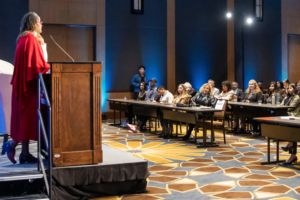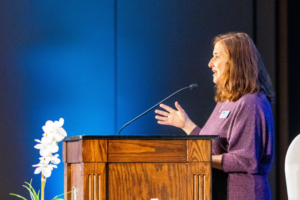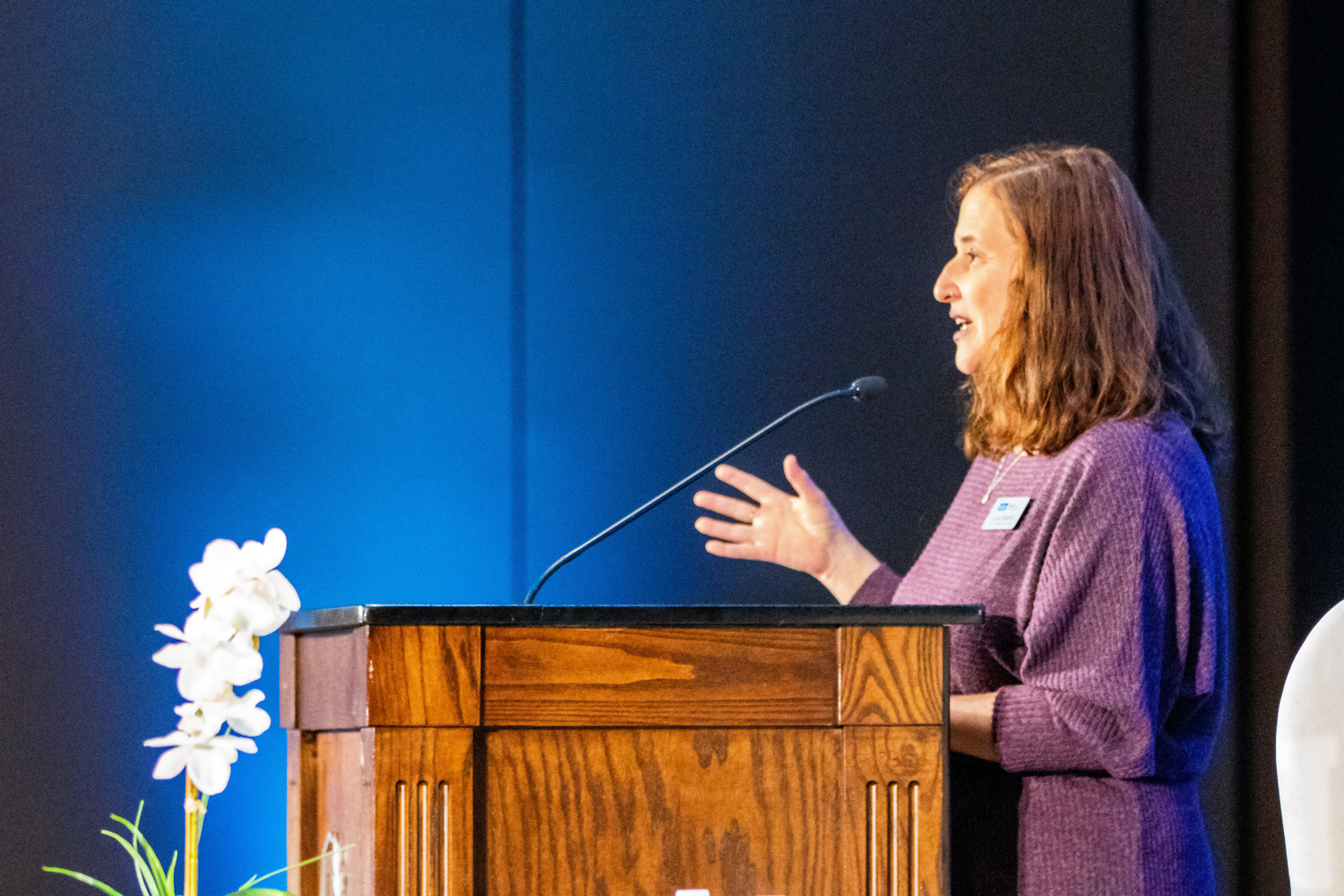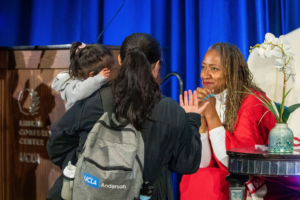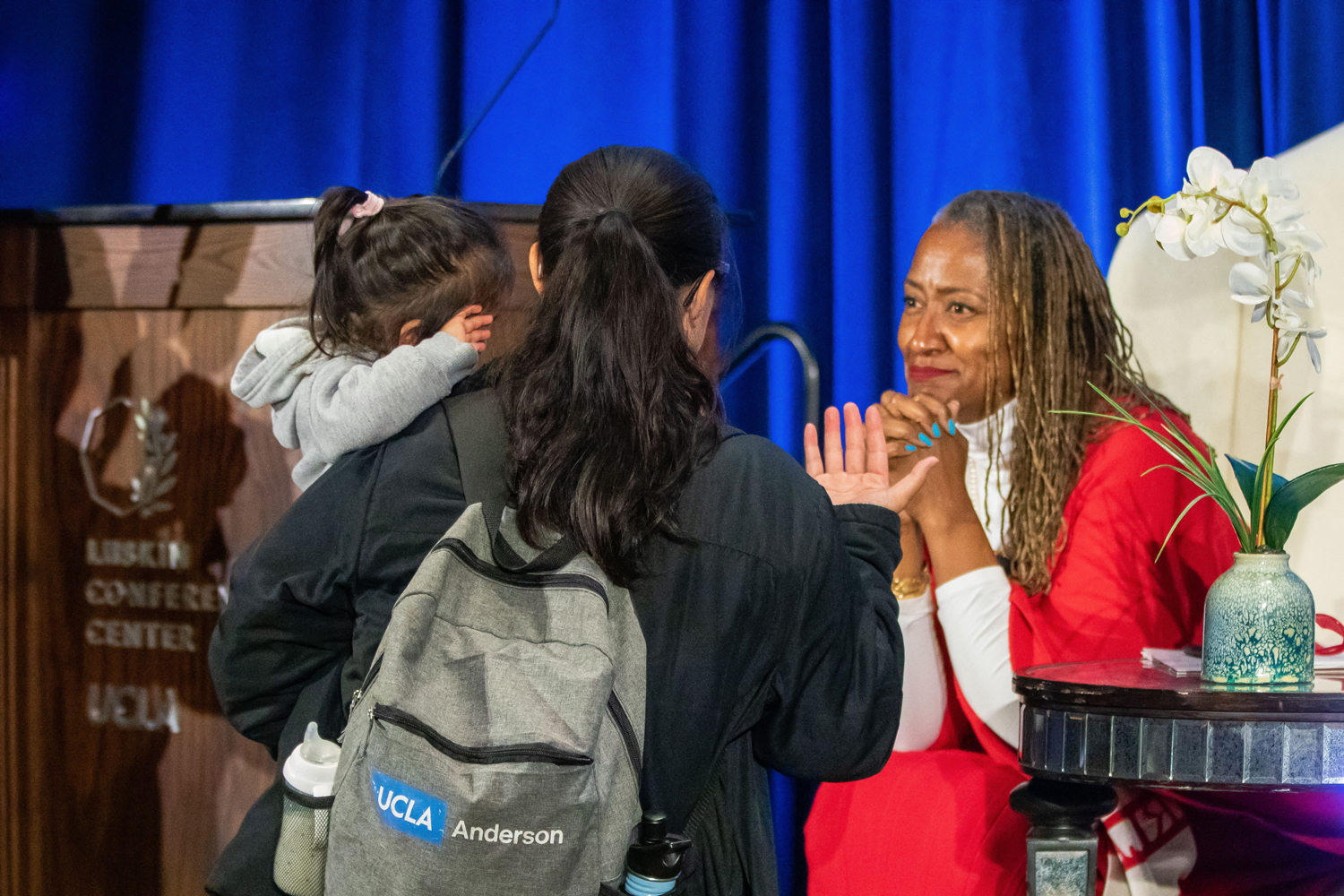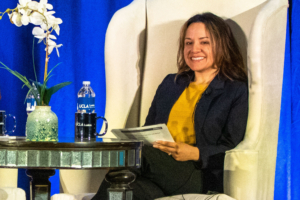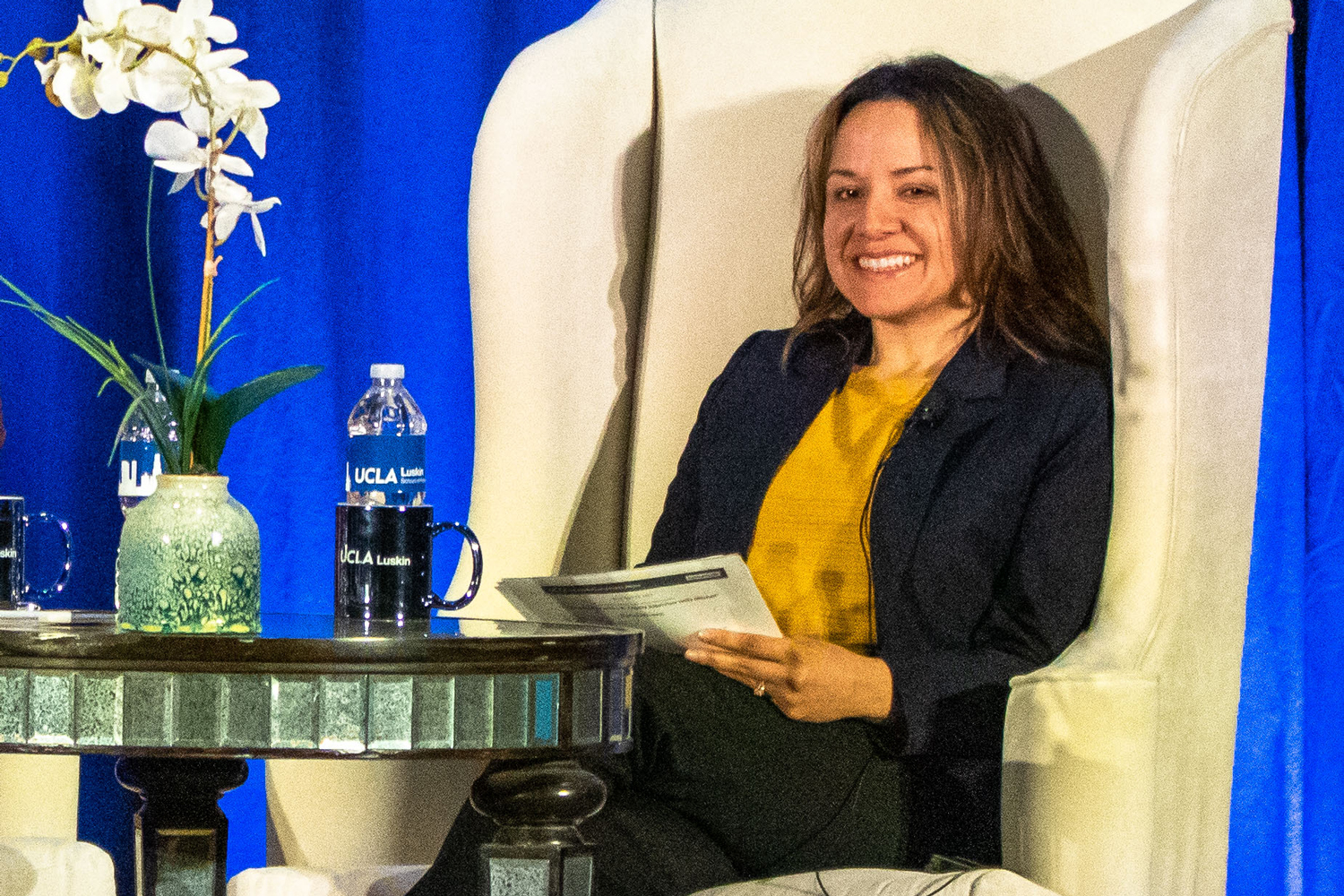By Les Dunseith
Poverty has been a cornerstone of the professional life of Los Angeles County Supervisor Holly Mitchell as an elected official and in her prior work within child and family welfare organizations. Today, she is at the forefront of next-generation approaches that she thinks could fundamentally dismantle poverty in our society.
Speaking on the UCLA campus during a May 3 Luskin Lecture organized by the Luskin School of Public Affairs, Mitchell urged a crowd of faculty, staff, alumni and students to rally behind a current movement that goes beyond simply strengthening the social safety net.
 “I think we have to reweave it, reimagine it and remake it to serve with equality, inclusion and humanity,” Mitchell said. “We have got to be as intentional about equity as previous generations have been intentional about exclusion.”
“I think we have to reweave it, reimagine it and remake it to serve with equality, inclusion and humanity,” Mitchell said. “We have got to be as intentional about equity as previous generations have been intentional about exclusion.”
Organized in conjunction with a yearlong 75th-anniversary celebration of social work education at UCLA, Mitchell was invited to speak because her focus on poverty coincides with the Luskin School’s mission.
Social work was born as a profession to respond to poverty and inequality in society, said Laura Abrams, professor of social welfare and department chair, in her introductory remarks. Yet, social services programs like welfare and food stamps “have too often been coercive and judgmental, [with] caste stigma and population stereotypes racialized and inflicting harm on communities.”
Since being elected as a supervisor in 2020, Mitchell has pushed help for disadvantaged communities as a countywide priority, and her office’s effort to ensure that equity is a centerpiece of the local COVID-19 recovery plan has been held up as a national model.
In the wake of the pandemic, public officials have access to what Mitchell described as a “once-in-a-generation onslaught of public funds called COVID-19 recovery dollars.” Past tradition in L.A. County would have meant simply splitting those dollars equally among the five supervisorial districts. That made no sense to Mitchell.
“From my perspective, it’s really pretty simple math: Those who have been disenfranchised and hit the hardest deserve the disproportionate investment in their recovery,” she said.
This led to the creation of the first-ever countywide equity formula and public dashboard to ensure that federal dollars reach those most impacted by the pandemic. The L.A. County formula incorporates economic, social and environmental factors to identify the communities with the highest need, so far allocating $1.9 billion to 120 projects from the Antelope Valley to East L.A. to South L.A. and beyond.
“For many of these neighborhoods, it’s the first time that government puts them at the front of the line for investments,” said Mitchell, who led one of the largest private, nonprofit child care and development corportations in California, Crystal Stairs, before entering politics and going on to serve in the California Assembly and Senate.
‘The era of invasive and patronizing social welfare in L.A. County is over,’ says Holly Mitchell.
A centerpiece of her policy history has been fighting against so-called benefit cliffs — eligibility restrictions on social services benefits that can trap people into cycles of poverty just to remain eligible for public assistance.
During her time at Crystal Stairs, Mitchell said, “my most painful days” related to working mothers faced with the prospect of losing public assistance because a work promotion would put them “pennies, literally, over the eligibility limit. And they were having to decide whether to walk away. ‘Do I keep this $3,000-a-month childcare voucher? Or do I take this promotion at work?’”
Eliminating such dilemmas requires radically new approaches, Mitchell said.
“The era of invasive and patronizing social welfare in L.A. County is over. I’ll put the final nail in that coffin right now,” she said, prompting supportive applause from the UCLA audience.
“Research has shown us that things like work requirements and impossible barriers to eligibility do nothing to truly address poverty. It just continues to criminalize poverty,” Mitchell said. “We’ve got to go beyond, in my humble opinion, poverty alleviation and focus on poverty disruption.”
Central to her poverty disruption agenda for L.A. County is a pilot program called Breathe L.A., which is one of the largest guaranteed income programs in the nation. Since March 2022, it has been providing 1,000 Angelenos with $1,000 a month. The payment will continue for three years, no strings attached, for randomly selected participants who are 18 years or older and have been negatively affected by the pandemic.
Assistant Professor Judith Perrigo is among the researchers at UCLA Luskin helping to evaluate Breathe L.A., joining scholars currently evaluating similar guaranteed income efforts across the nation and around the world.
Mitchell said that early results of that research belie the misguided perception put forth by opponents attempting to cast doubt on whether recipients will spend the money wisely.
“What’s the No. 1 thing participants in Breathe L.A. have spent the money on?” Mitchell asked the crowd, pausing a moment to let her listeners think about an answer. “It’s food. Food and basic necessities to feed their families. And making sure one less child is going to bed hungry, I believe that’s a good thing.”
After her prepared remarks, Mitchell was joined on stage by Perrigo for a Q&A session. “You have fire inside of you,” Perrigo told Mitchell, then invited her to describe where she finds the courage to advocate for poverty approaches like guaranteed income that have a history as political lightning rods.
Mitchell stressed the public servant aspect of her role, saying she thinks about the new mothers among her constituency who dream of creating a better life for their children.
“Everyone has the right to have that dream. And the role of our society is to not create barriers to lift those possibilities,” Mitchell said. “When I think about things like that, it gives me the courage to go against the grain and fight.”
She recalled her effort in Sacramento to do away with a state provision that penalized low-income families receiving cash aid for having another child. After three frustrating defeats, she found success on the fourth try.
It will take similar perseverance to make guaranteed income a cornerstone of social services policy.
“It’s a righteous fight,” said Mitchell, urging supporters in the audience to look at the gradual rollout of guaranteed income efforts as “an opportunity to expand your warrior base of people who will fight.”
She noted that the basic idea of guaranteed income is not new — Martin Luther King Jr. was a proponent, in fact. Decades later, it’s only now taking hold.
“It’s a movement,” said Mitchell, comparing Breathe L.A. to today’s bedrock public aid programs like Medicare and Social Security.
“Those were, in their time, cutting-edge, innovative concepts around income security,” she said. “When I think about those game-changing, life-saving policy initiatives that I’m sure had a very rough start also, I believe we can get there.”
The name, Breathe L.A., implies providing the means to weather a crisis — a little time to breathe — directly to people facing financial hardship.
Perrigo noted the popularity of the idea among lower-income, underserved communities and their advocates. But how will policymakers like Mitchell persuade skeptical taxpayers?
“If we are able to create healthier communities, safer communities, everybody benefits,” Mitchell said.
Public education is also necessary.
“It’s trying to acknowledge and help [skeptics] understand they started out 10 steps ahead, and this other community is trying to catch up. I think it’s important to have those kinds of conversations,” she said, “because that’s the honest truth.”
Mitchell is also a board member of LA Metro, and in response to a question from the audience, she said her priority for public transportation in the county is bus service “because that’s what a lot of our poor rely on.”
Eventually, she said, her goal is an entirely fareless bus system. For now, she takes heart in the success of Metro’s GoPass pilot program, which has provided more than 241,000 youths a free transit pass since it launched as a pandemic recovery measure in October 2021.
“The data … on school attendance is mind-blowing,” Mitchell said. “For some of us, it may be hard to imagine that $1.75 can stop a lot of people from going to school, but it can. Our K-12 ridership is double the pre-pandemic numbers.”
Much of Mitchell’s presentation focused on touting accomplishments, but she acknowledged that L.A. County has no shortage of problems yet to be solved. Homelessness is a primary ongoing concern, “and we are 500,000 housing units short in L.A. County,” she said. “So, we have to build.”
Mitchell acknowledged that reality leads to difficult conversations. Want to stir up a political hornet’s nest? There’s no surer way in Los Angeles than going to a community homeowners association and talking about building more densely in neighborhoods zoned for single-family homes, she said.
“People will roll up on me, and it’s, ‘What do you do about the homeless?’ And I say, ‘Well, as soon as you tell me how you are willing to have the composition of your own block change, I’ll tell you what I’ll do about the homeless,’” Mitchell said.
“It is our moral dilemma,” she said. “And only when we have decided that we are sick and tired of being sick and tired — and that we’re not going to allow people to live like this anymore — can [developers, public agencies and governments] expand and build the diversity of housing that people need.”
View additional photos on Flickr:

 A newly published political memoir by
A newly published political memoir by 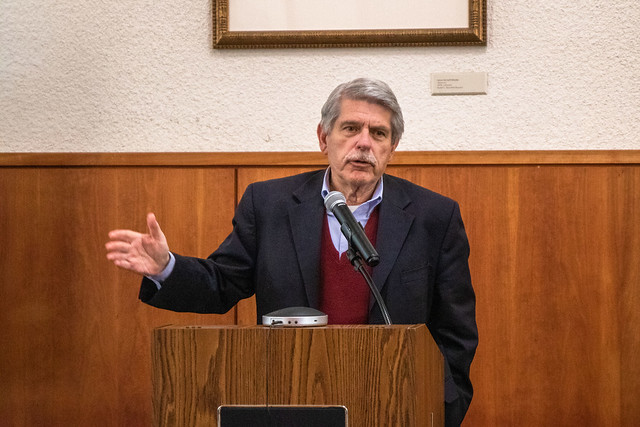
 “I think we have to reweave it, reimagine it and remake it to serve with equality, inclusion and humanity,” Mitchell said. “We have got to be as intentional about equity as previous generations have been intentional about exclusion.”
“I think we have to reweave it, reimagine it and remake it to serve with equality, inclusion and humanity,” Mitchell said. “We have got to be as intentional about equity as previous generations have been intentional about exclusion.”
